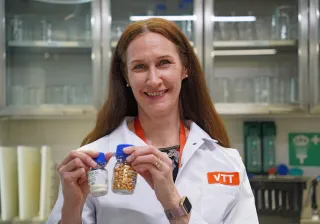The EU-funded Sustain-a-bite project is set to redefine plant-based eating with nutritious, minimally processed foods that propel health and sustainability, one bite at a time.
Over the next three and a half years, Sustain-a-bite consortium will spearhead the development of new plant-based foods while improving accessibility and sustainability in European diets. With support from the EU's Horizon Europe programme, this collaborative effort seeks to create foods that satisfy both taste and health needs while lowering environmental impacts. The project is coordinated by VTT Technical Research Centre of Finland, and the consortium includes 19 partners from 13 countries.
“Our mission is to deliver technology solutions that enable healthier, more accessible and appealing plant-based food options, respecting European food traditions while promoting sustainability”, said Nesli Sözer, Sustain-a-bite coordinator and research professor at VTT.
The aim of Sustain-a-bite is to develop minimally processed food alternatives using whole grains (barley, faba bean, and chickpea) and upcycled side-streams from the food industry, such as apple, carrot, and tomato pomaces.
“Since the Industrial Revolution, we’ve focused on stripping nutrients (e.g. dietary fibre, vitamins, and other health promoting compounds) from grains to improve taste and texture. Now, Sustain-a-bite is flipping the script – bringing them back with natural, innovative processes for healthier, tastier plant-based foods, without relying on artificial ingredients or preservatives” added Nesli Sözer.
Hello nutritious, tasty and affordable foods!
Sustain-a-bite food design approach focuses on developing foods rich in protein, dietary fibre, vitamins, and essential nutrients, with low levels of anti-nutritional factors, saturated fats, and added sugars, thereby promoting associated health benefits.
By harnessing the power of nature through developed co-(bio)processing concepts, Sustain-a-bite consortium is on a mission to produce clean-label, nutritious, versatile ingredients that reduce the reliance on additives. These ingredients offer benefits for the healthiness, affordability, and sustainability of plant-based foods.
Moreover, Sustain-a-bite minimal processes are easily accessible and adaptable for use by local, small enterprises, as well as larger companies, facilitating widespread adoption and implementation.
Sustain-a-bite was officially launched on 1 October, 2024 and is set to end on 31 March, 2028. The project gathers partners from across Europe with multidisciplinary expertise, including universities and technological centres, large food companies, along with experts in consumer behaviour, D&C and exploitation. Project partners are: VTT (Finland), University College Cork (Ireland), Wageningen Food & Biobased Research (the Netherlands), IBA BUCURESTI (Romania), University of Milan (Italy), Innovarum (Spain), University of Vaasa (Finland), Teagasc (Ireland), Technical University of Denmark (Denmark), IZTECH (Turkey), University of Oxford (UK), University of Porto (Portugal), MOA Foodtech (Spain), EIT Food CLC North-East (Poland), Roquette (France), Viking Malt (Finland), Tymbark (Poland) – MASPEX (affiliated entity), BezMięsny (Poland), and Bern University of Applied Sciences (Switzerland).
More information about the project is available at: https://sustain-a-bite.eu/
Follow Sustain-a-bite project on social media!
This project has received funding from the European Union’s Horizon Europe research and innovation programme under Grant Agreement No. 101180399, and the Swiss State Secretariat for Education, Research and Innovation (SERI) under the Swiss government’s Horizon Europe funding guarantee. Funded by the European Union. Views and opinions expressed are however those of the author(s) only and do not necessarily reflect those of the European Union or European Research Executive Agency (REA). Neither the European Union nor the granting authority can be held responsible for them.








